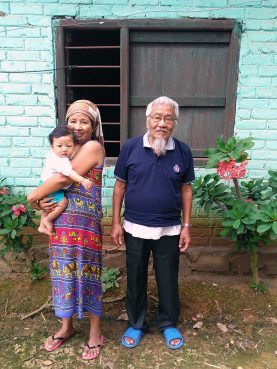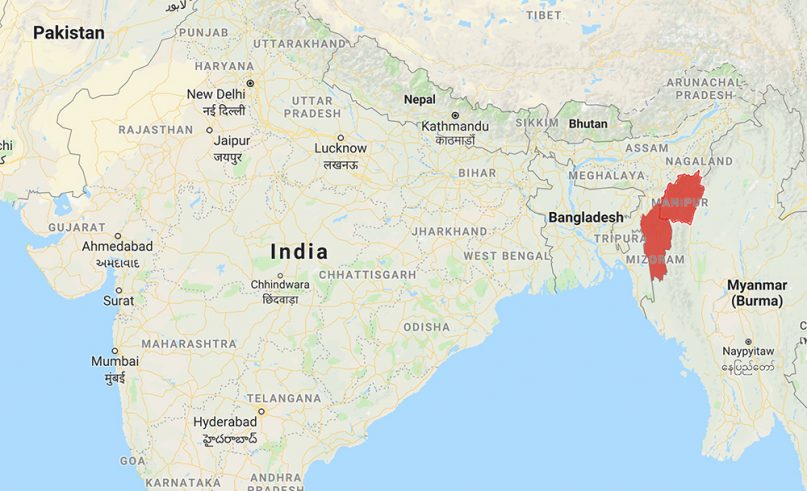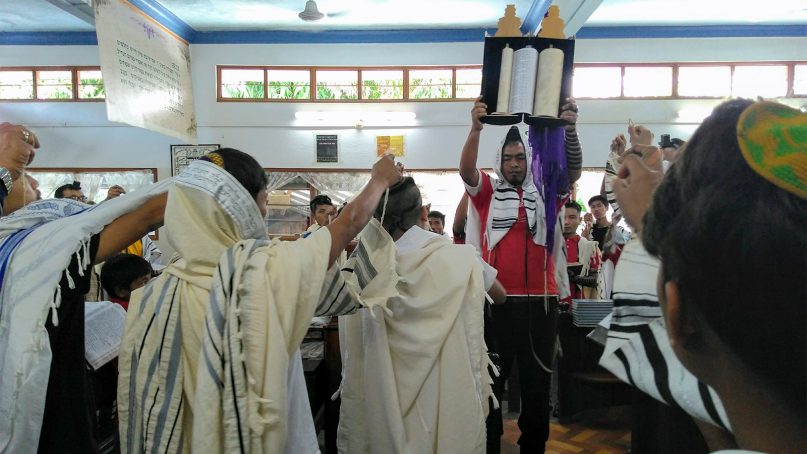MANIPUR, India (RNS) — Wearing a pale-yellow tallit — the traditional Jewish prayer shawl — Aharon Vaiphei points to a map of Jerusalem at the Shavei Israel Hebrew Center in Manipur in northeastern India. “This is the land of our ancestors,” said Vaiphei, 32, a Bnei Menashe Jew who hopes to make aliyah (immigrate to Israel) this year.
Vaiphei’s dream is shared by the estimated 7,000 Bnei Menashe Jews who are scattered across the rural agrarian landscape of Manipur and neighboring Mizoram. They are keen to return to what they consider their ancient homeland.
The Bnei Menashe claim to be descended from one of the 10 lost tribes of Israel that were exiled by the Assyrian Empire in about 740 B.C., even though there’s no historical record of this. Their pamphlets, based on oral tradition, recount how the Bnei Menashe escaped slavery and made their way to Afghanistan, China and Burma before settling in northeast India. To this day, they believe their origins are different from the local Indian population’s.

Chairman of Bnei Menashe Council Thangkam Avihu Singsit, right, with wife, Ziva, and grandson at their residence in Manipur on Aug. 15, 2018. RNS photo by Priyadarshini Sen
“Despite local variations in interpretation of the Israelite claim, they’ve published many pamphlets representing different groups which have emerged over the past two decades claiming an Israelite connection,” said Shalva Weil, a senior researcher at the Hebrew University of Jerusalem in Israel.
So far in 2018, more than 430 Bnei Menashe have immigrated to Israel, making it one of their largest exoduses from India since 1989. More are expected to make aliyah given stronger economic and political ties between India and Israel, and formal recognition of the Bnei Menashe by some Israeli rabbis.
“The bettering of relations between India and Israel and a flush of funds has possibly prompted the migration,” said Thangkam Avihu Singsit, chairman of the Bnei Menashe Council in Manipur. “But more importantly, our Jewish ancestry has finally been recognized.”
It’s been a long, winding path to Israel for the Bnei Menashe who have made aliyah.
In 1983, Orthodox Rabbi Eliyahu Avichail scoured the world for the 10 lost tribes and encouraged Bnei Menashe to return to Israel. The Bnei Menashe’s move to Israel got a boost when Michael Freund, a former aide to Prime Minister Benjamin Netanyahu, set up a nonprofit, Shavei Israel, in 2002 to help the Bnei Menashe reclaim their roots.
A 2005 rabbinical ruling by Shlomo Amar determined that the Bnei Menashe were “seed of Israel” — a term for those who are considered Jewish not by religious law but by ancestry. But a government document obtained by the Israeli newspaper Haaretz in 2015 revealed that Amar had, in fact, ruled that Bnei Menashe did not have established Jewish ancestry.
The Israeli government at the time turned down the mass immigration plan.
“We were anxiously waiting to immigrate to Israel. This was a big setback for our community,” said Samuel Haokip, a Bnei Menashe leader from Churachandpur.
When Netanyahu was re-elected prime minister in 2009, Freund again found support for his claim that Bnei Menashe are the living bridge between India and Israel. The chief rabbinate of Israel, too, accepted them as Jews for their devotion, but said they would have to undergo formal conversion to become naturalized citizens.
Freund began education and conversion services at the Shavei Israel centers in Manipur and Mizoram. Once in Israel, the Bnei Menashe go through a ritual conversion. After that, Freund’s nonprofit helps them scout for housing, education and employment in Israel. Upon completion of their education, the Bnei Menashe are granted citizenship.
Their exodus from India hasn’t gone without criticism.
Haaretz’s report claimed that the return operation “has been fraught with questionable government decisions, an ambiguous rabbinical ruling and potential conflict of interest.” The report noted that new Bnei Menashe arrivals weren’t provided housing in settlements on the West Bank. Rather, they were dispatched to locations in northern Israel where conservatives perceived an “Arab threat” to the local Jewish people.
The report revealed that the community hadn’t integrated well into Israeli society but that “they fear that if they speak out, it could affect the chances of their relatives being placed on the lists of those deemed eligible for immigration to Israel.”
When India Prime Minister Narendra Modi visited Israel last July, hundreds of Bnei Menashe immigrants gathered to greet him. “The strategic partnership between India and Israel has reached a new height,” said Sushil Kumar, deputy secretary at India’s Ministry of External Affairs. “When two countries are in sync with each other, migration of people is a natural outcome.”
Many Bnei Menashe inhabit Manipur’s remote Churachandpur district. The 23 tribal communities living in villages framed by low-lying hills are subsistence farmers. While it’s important for them to make aliyah, they also seek upward social and financial mobility.

Manipur and Mizoram in northeast India. Map courtesy of Google Maps
Yehuda Khongsai, a 25-year-old community leader from Khochijang, is on the waitlist for making aliyah. “Not only do I want to get the full flavor of Jewish life in Israel but also have access to better employment opportunities,” he said.
Khongsai was interviewed by rabbis and Shavei Israel officials who came to Manipur in 2015 to select eligible candidates. “These interviews assess our commitment to Judaism. The families that clear the test immigrate in small batches.”
Other Bnei Menashe are eager to break new ground in a foreign country. But before that, the Hebrew centers in Manipur and Mizoram — microcosms of what they believe to be the Promised Land — initiate them into Judaism.
Within the precincts of Manipur’s Hebrew center, the faithful offer prayers at the Beit Shalom Synagogue, which boasts two Torah scrolls enclosed in an ornamental closet. When the cantor reads from the siddur, or Jewish prayer book, the devotees chant prayers in Hebrew.
Later, the devotees gather in the open hall for community events. Some learn Hebrew in a library that has basic resource materials on Judaism, while married women use the mikvah for ritual purification.
“This is my universe and a place of refuge,” said Ruth, a 32-year-old community member from an adjoining neighborhood. Throughout Elul — the Hebrew month — she makes penitential prayers at the synagogue. “This time too, I’m praying for aliyah. The Hebrew center is just a steppingstone for embracing Jewish life,” she said.
Doron, a student from one of Churachandpur’s remote villages, believes he can make a mark in the Israel Defense Forces. “My friend made aliyah a few years back and underwent military training in Israel. My lifelong dream is to serve in the defense forces,” he said. Other young converts have professional aspirations. They want to undergo training to become English teachers, computer technicians and engineers.
Older Bnei Menashe want to fulfill their cherished dream of full absorption within Israel’s society. “Our forefathers continued to practice Judaism — including observing Sabbath, keeping kosher and following the laws of family purity. It’s time we returned to the land of our ancestors,” said Zevulun Haokip, 70, chairman of Beit Shalom Synagogue.
“My grandmother had said India is our residence, but Israel is our home,” said Vaiphei. “We want to go back home.”





